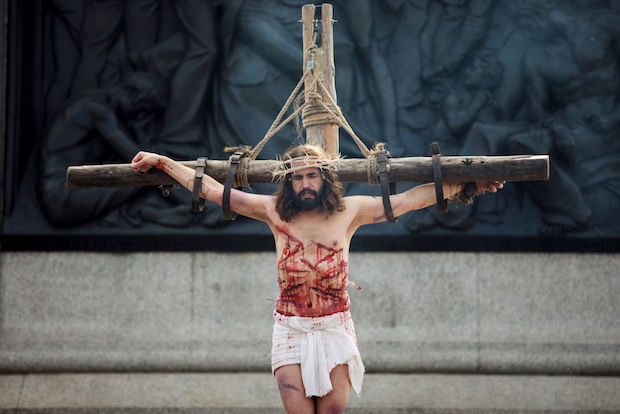Christ is risen; happy Easter all round. It’s a pleasing festival in all sorts of ways, chief of which is that it’s wildly uncommercial, being the Sunday following the full moon following the spring equinox, if I’ve got that right. So, not a usefully neat date like 25 December, and one that retailers find much more difficult to exploit except as a means of flogging lamb legs (folks – lambs have only four legs, but they also come with shoulders, you know, which are even nicer) and obviously, chocolate eggs… though Eastern Christians do it better, with hand coloured eggs, which they get blessed at church.
Anyway, it’s still a Christian festival, so cue for the usual bout of anxiety about the condition of Christianity in England. In the Middle East, Christians get murdered for professing the faith; in Britain, it’s more a matter of being put in the cultural margins. So, as Theo Hobson observes, it’s nice that Theresa May has assumed her late father’s mantle, and talks about it being right and proper for Brits to be free to affirm their faith, including faith in Christ. The vicar’s daughter is, thank goodness, doing her bit for the CofE by dint simply of talking about it. And Jeremy Corbyn, from outside, has been benign about the feast – the influence of that excellent organisation, Christians on the Left, can, I think, be discerned here.
Most Specator readers, I think, will rather regret that, statistically, the CofE is decreasing in numbers – it has the churches and cathedrals, but Muslim communities have the numbers and commitment. If you want the grisly figures, Linda Woodhead, the sociologist of religion, has them; or the website Counting Religion in Britain. The most obvious cause for concern about the CofE is not numbers but demographics. A recent study, The Last Active Anglican Generation, (OUP, 2017, £50 – so one to get from a library), is a study of Anglican laywomen from what the author calls Generation A (born in the twenties and thirties) in the UK and North America. Among its observations is something called pew power, viz, the notion of power over the institution wielded by ordinary congregations and parish workers – as opposed to leading from the front, the institutional stuff. But the point of it is in the title.
The unfortunate thing about Generation A is that it’s diminishing by the year, as its members go to their eternal reward, for a lifetime of church fetes, flower arranging, keeping the keys for empty churches and turning up, Sunday after Sunday. So, I have a simple proposal for the cultural Christians who agonise about the rise of Islam and the vanishing Christian character of Britain: go to church. Take the place of Generation A. Turn up for Easter Sunday as well as Christmas; keep Pentecost Sunday, because hardly anyone now knows what Whit Sunday stands for, and Ascension Thursday. There are lots of churches out there, you know: Anglicans in cities are spoiled for choice, and you can’t throw a brick in places like Norfolk without landing on something fabulous from the fifteenth century. Anglicans have, moreover, for those that seek it out, the loveliest liturgy, and you don’t deserve it. There are rubbish clergy, of course, but, you know, it’s possible to separate your feelings about the thing that’s being celebrated from the celebrant (Catholics are quite good at this). So, get out there. The numbers attending Anglican services fell below a million at the beginning of last year; they’re still falling.
It’s kind of Matthew Parris to wish the CofE well from outside, but the institution is not going to survive on the basis of the flying buttresses (to quote Winston Churchill) alone; it needs pillars even more. Go and get stuck in, reader, or else abstain from complaining about the cultural atrophy of the West.







Comments